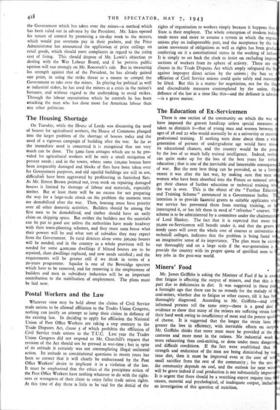The Education of Ex-Servicemen
There is one section of the community on which the war ss have imposed the gravest handicap unless special measures a taken to diminish it—that of young men and women between t ages of i8 and 22 who would normally be at a university or receivi professional training. If nothing were done about them a wh generation of persons of undergraduate age would have miss its educational chances, and the country would be the poor• by the loss of so much fully trained intelligence. Indeed, nothi can quite make up for the loss of the best years for tertia education ; that is one of the inevitable and lamentable consequent 1 of war. But the next best thing can be provided, as to a limit. a extent it was after the last war, by making sure that men a women who have been absorbed into the Forces or national servi get their chance of further education or technical training wh the war is over. This is the object of the " Further Educati' and Training Scheme" announced in a Government leaflet. intention is to provide financial grants to suitable applicants wh war service has prevented them from starting training, or interrupted it, or has left them in need of " refresher " courses. scheme is to be administered by a committee under the chairmansh of Lord Hankey. The fact that it is expected that more th. 5o,000 ex-Servicemen will benefit under it, and that the grants needy cases will cover the whole cost of courses at universities technical colleges, indicates that the problem is being faced wi an imaginative sense of its importance. The plan must be cart:• out thoroughly and on a large scale if the war-generation is provide the country with its proper quota of qualified men to key jobs in the post-war world.


























 Previous page
Previous page